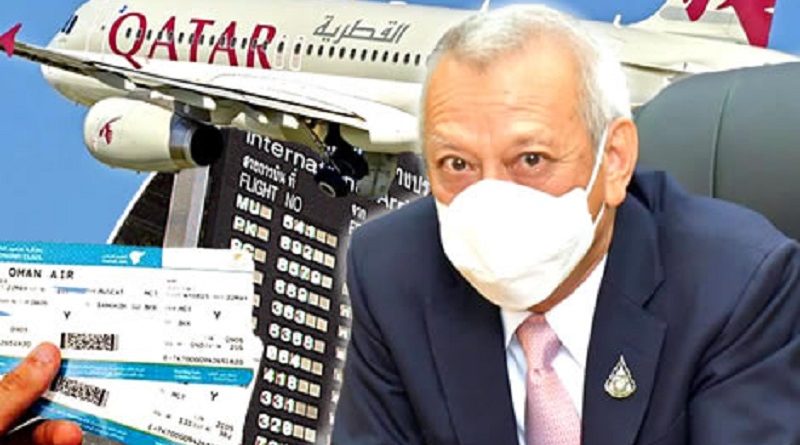Tourist Levy Hits Further Turbulence With Fears It Could Harm Airline’s Effort To Boost Flight Numbers: Thailand
Source: thaiexaminer
The fee will provide automatic insurance cover with 11.3% of the money from it going to pay for limited medical insurance coverage for visitors with a ceiling of ฿500,000 for 30 days after they first enter Thailand while 88.7% will go to a fund to be used by the government to develop foreign tourism infrastructure in the kingdom. However, ongoing efforts to implement the proposal have repeatedly been stalled or postponed since 2019 and even before this, similar moves in 2006 and 2013, all fell through. Many observers feel that the likelihood of a General Election being called between now and the end of 2022 as well as the pressing and critical economic need to boost foreign tourism numbers with increased international flight connections and frequency into Thailand may see the plan being postponed yet again.
Efforts by Thailand to introduce a new tourist levy to be known as the Thailand Tourism Fee (TTF) are making slow progress after it was confirmed this week that the plan is currently being delayed over discussions to formulate a method to collect the charge for incoming travellers by land and sea. It has also emerged that the proposed collection method has generated resistance from the international airline industry who are being asked to charge the fee which involves communication between Thailand’s Ministry of Tourism and Sports and aircraft with the finalised passenger manifest required to be transmitted to Bangkok 15 minutes after takeoff for each incoming flight to the kingdom. Industry sources fear this may jeopardise efforts to increase flight frequency into Thailand this year to boost foreign tourist numbers. It has also been confirmed this week that there will be no exemption for expat residents or foreigners working in Thailand.
Thailand’s efforts to introduce a foreign tourism levy on incoming passengers and arrivals to the kingdom have been postponed again with the assistant permanent secretary at the Ministry of Tourism and Sports, Mongkon Wimonrat, at this time, citing concerns about how to record the arrival of passengers by sea and land to the country as the reason for the delay and the continuing hiatus relating to the measure.
There are also reported ongoing concerns about the proper handling of passenger data under various data protection laws in different countries of origin for flights into Thailand.
New tourism levy to be called the Thailand Tourism Fee (TTF) under plans rolled out in April this year
The current proposed version of the levy, the implementation of which is being finalised, is called the Thailand Tourism Fee (TTF) and earlier in the year, the government decided to collect the fee through airline charges paid by passengers entering Thailand which ran into some resistance.

Unde a plan rolled out in April, airlines had to register to participate in Thailand Tourism Fee (TTF) systems designed by the Thai government by May 2nd.
Pushback from international airlines
The new fee was to be collected by a signal sent by the airlines after take-off confirming the number of inbound passengers to Thailand for the flight in progress.
This has seen negative feedback from airlines flying into the kingdom as the proposed fee collection process involves the deployment of resources by the airlines to carry out additional procedures as well as staff training at a time when the industry is experiencing turmoil as it attempts to ramp up flight capacity to meet demand in the face of higher jet fuel prices and a lack of manpower worldwide with workers in the industry demanding increased pay due to runaway inflation amid labour shortages.
Latest setback and delay for an initiative launched in 2019 by the ministry which was aimed primarily at providing automatic insurance cover for tourists
It is the latest setback for the current initiative which has been mooted since 2019 when the minister commissioned Naresuan University and the Office of the Insurance Commission to come up with a viable plan for the levy whose main goal, at that time, was to provide automatic insurance cover for travellers to Thailand.
This followed a string of embarrassing international press reports featuring holidaymakers in Thailand who suffered serious injuries, health emergencies or even death which were relayed in the international media with dramatic stories of families in their countries of origin frantically trying to raise funding to pay for medical costs, expensive international medical evacuation operations or expenses linked with returning bodies or funeral arrangements for close relatives or friends in Thailand.
Need for effective insurance for all holidaymakers to avoid negative publicity for Thailand and a perception of danger created by disturbing news reports
The need for foreign tourism insurance cover grew in recent decades with more younger tourists visiting the kingdom who embarked on adventure tourism exploits which often included hiring motorbikes or bicycles while the kingdom has a large cohort of middle-aged or elderly tourists who are more likely to experience health emergencies.
Another reason, alluded to by senior Thai officials in recent months, is the perceived danger to foreign tourists due to the kingdom’s propensity towards political unrest.
This latest initiative which followed similar efforts in 2013 and 2016 then became part of a wider levy proposal advocated by the Tourism Authority of Thailand (TAT) to provide a well-resourced fund to strenghten the kingdom’s foreign tourism infrastructure similar to the tourism levy in Japan or a levy imposed on the popular Indonesian island of Bali on departing foreign tourists.
Fee could also generate over ฿10 billion a year to develop the foreign tourism industry in the kingdom
If successfully implemented in Thailand either late this year or next, the fee could eventually generate up to $320 million or ฿11.7 billion per annum if the country’s foreign tourism sector returns to normal or 2019 levels of arrivals.
This would mean an annual contribution of ฿10.4 billion towards the development of the industry and improved infrastructure, per annum.
This week, however, the assistant permanent secretary at the ministry, Mr Mongkon, did offer some definite guidance on some other outstanding issues concerning the proposed fee, the implementation of which is still being ironed out.
Charge will apply to all foreigners or non-Thai citizens and not just tourists, on entering Thailand
The latest news is that the tourism fee will now apply to all foreigners entering Thailand and not just holidaymakers or tourists.
This is the result of ongoing discussions with the airlines where it was noted that carriers only had access to the information on passengers’ passports and could only, therefore, distinguish based on nationality.
This means that an earlier proposal to exempt foreigners living in Thailand, or those carrying work permits as well as diplomatic personnel, will now be scrapped.
The only airline passengers to be exempted from the proposed ฿300 fee ($8.20) will be Thai nationals or people identified as Thai by their passports presented when checking in for a flight.
The fee itself, this year, was finally agreed at ฿300 of which, it is understood, ฿34 will go to the costs of providing insurance cover for the foreign passengers, the balance going into the tourism development fund.
Each flight bound for Thailand, on takeoff, to transmit a final passenger manifest to Bangkok as part of the fee collection process imposed on airlines
The insurance cover under the levy will be confirmed when the airline sends the Thailand Tourism Fee (TTF) signal, 15 minutes after the flight take off for Thailand. It will be activated once the passenger is cleared through immigration after arrival in Thailand for a period of 30 days.
The proposal to charge a foreign tourist levy for automatic medical insurance for visitors to Thailand has long been broadly welcomed by both the travel industry and indeed most visitors themselves on the basis of offering essential insurance coverage although many passengers will already have such cover as part of their ticket package from their airline or as part of their credit card package.
However, the confirmed coverage, this week, is limited to ฿500,000 ($13,650) and specifically does not include coverage for COVID-19.
Limited insurance cover which, significantly, excludes medical evacuation from Thailand in an emergency
It also has a limitation on claims associated with what has been termed ‘emotional distress’ which is limited to ฿20,000.
At the outset of the proposal, a key requirement from travel experts was that there should be coverage for medical transport or evacuation to the tourist’s home country in the event of an emergency, an operation that can cost anywhere from $100,000 to $250,000.
Fee raised from ฿100, when first proposed, to ฿300 after tourism development fund plan gained traction
This is disappointing given that the initial fee proposed was for ฿100 but it should be noted that later proposals even recommended a fee of up to ฿500 as discussions on the proposal between the ministry and tourism agencies veered towards the exclusive focus on building a foreign tourism development fund shifting away from the levy’s originally intended goal which was to assure foreign tourists to Thailand in the event of an accident or emergency.
Essentially, the aim is to make the perception of Thailand by foreign travellers look safer.
The proposed fee is part of the National Tourism Policy Act of 2008 passed at a time of political turmoil in Thailand.
Earlier this year, the Minister of Tourism and Sports, Phiphat Ratchakitprakarn, confirmed the ฿300 charge which was to come into effect in August or September before airlines raised their concerns.
‘The tourism fee is in line with the revised National Tourism Policy Act of 2008, which granted permission to set up the fund from the fees collected from foreign visitors. The fund will be used to develop tourist sites and offer tourists insurance,’ explained Ministry of Tourism and Sports permanent secretary Chote Trachu at the end of April.
Training offer to airlines flying to Thailand before the levy comes into force after 90 days waiting period when first published in the Royal Gazette
It is understood that the Tourism Ministry is offering training to airlines as part of the proposal to make sure that the fee collection works smoothly when it comes into force and does not cause confusion or hinder the process of flying passengers into the kingdom.
The levy will only come into effect after it is approved by the Thai cabinet and later published in the country’s Royal Gazette which will trigger a 90-day waiting period before the measure becomes law.
Some source suggests that it is unlikely that the new scheme will be launched at the end of the year which, in practical terms, is the current timeline as it may cause complications to the country’s efforts to ramp up foreign tourist arrivals as Thailand find itself struggling economically and badly in need of more tourists and income generated by the industry to balance its monthly current account deficit currently running at 1% of GDP.
Also towards the end of the year, Thailand is likely to find itself in election mode with a new election due to be held sometime before March 2023.
Fears the tourism fee could hamper tourism revival plans as airlines struggle to meet demand worldwide
There are real fears that the issue may hamper efforts by airlines to increase flight frequency into Thailand with the Tourism Authority of Thailand (TAT) Director-general Yuthasak Supasorn confirming in recent weeks that the kingdom is only operating at 33% of the connectivity that existed before 2019 and that it needs at least 50% of that level to achieve its goals this year which is a target of 10 million foreign tourists.
Although the fee itself is negligible for international travellers, the extra administrative demands placed on airlines could lead to some prioritising other routes as they ramp up their flight schedules.
In a briefing to the media after the proposed Thailand Tourism Fee (TTF) was taken off the agenda of a cabinet meeting in June where it was to get the go-ahead for an end-of-year launch, Minister of Tourism and Sports Phiphat Ratchakitprakarn explained that one reason for the postponement, at that time, was a concern over the proportionality of the ฿300 charge after it emerged that a large proportion of arrivals into Thailand were passengers on short stopover flights or people who only spent one to two days in the kingdom.




